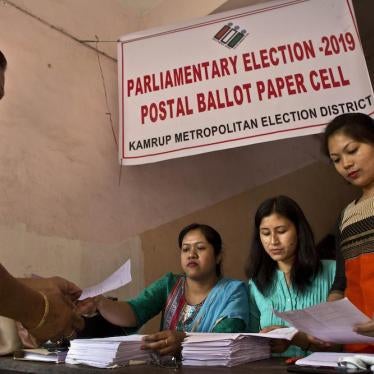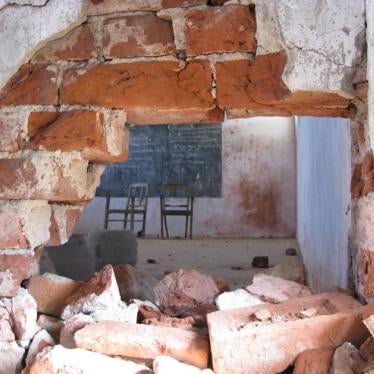To Whom It May Concern,
Respect for economic, social, and political rights has declined in India in recent years. We are writing to urge you to adopt human rights protections as a key part of your pledges and manifestos ahead of parliamentary elections in April and May 2019.
Human Rights Watch is an independent, international, nongovernmental organization dedicated to defending and promoting human rights in more than 90 countries around the world.
Indian voters deserve a substantive debate during the campaign about issues that affect them, particularly with respect to human rights. Now is the time to make a public commitment for reforms that will strengthen India’s human rights record. Set forth below are human rights priorities that candidates and political parties should support.
We hope that you will adopt these commitments as part of your own political platform and ensure that the next parliament and government implements these important recommendations.
Protect Freedom of Association and Assembly
There are growing restrictions on civil society in India. Numerous activists and lawyers have faced physical attacks and threats by extremist groups. At the same time, police have used allegations ranging from sedition to financial impropriety to crack down on dissent.[1] Laws such as the Foreign Contribution (Regulation) Act (FCRA) are used to shut down foreign funding for civil society organizations critical of the authorities.[2]
We hope that you will commit to:
- Amend the FCRA so that it does not interfere with basic freedoms of association and assembly and cannot be misused to choke the protected activities of civil society organizations.
- Amend the Unlawful Activities Prevention Act to ensure that restrictions on organizations respect the right to freedom of association under international law.
Protect Freedom of Expression and Privacy
Laws on sedition, criminal defamation, national security, and counterterrorism have been used to curb the right to freedom of expression, even as incitement to discrimination, hostility and violence through political rhetoric is on the rise.[3]
Human Rights Watch and other international organizations and experts have said that the new proposed Information Technology (Intermediary Guidelines) Rules threaten privacy, freedom of expression, encryption, and cybersecurity standards.[4]
We urge you to commit to:
- Repeal sedition, criminal defamation, and other laws that are misused to silence peaceful dissent.
- Withdraw the draft amendments proposed to the Information Technology (Intermediary Guidelines) Rules.
End Impunity for Security Forces
To uphold rule of law, it is crucial that security forces and police that commit human rights violations are held to account. However, too often, impunity prevails even in egregious cases of torture or extrajudicial killings. The Armed Forces Special Powers Act (AFSPA) provides soldiers effective immunity from prosecution for serious human rights abuses.[5] Police reforms remain stalled even as police are accused of torture and extrajudicial killings in several new cases.
We hope that you will pledge to:
- Repeal the Armed Forces (Special Powers) Act and remove legalized immunity granted under the Criminal Procedure Code to security forces.
- Implement police reform as recommended by the Supreme Court.
- Enact the pending Prevention of Torture Bill, but only after ensuring it conforms with the Convention against Torture and Other Cruel, Inhuman or Degrading Treatment or Punishment.
Protect the Rights of Dalits, Adivasis, and Religious Minorities
There have been growing attacks on religious minorities, particularly Muslims, in India in recent years.[6] In addition, Dalits and Adivasis continue to face discrimination and have been targeted in violent attacks.[7]
Rights groups have raised concerns that registration requirements for the biometric identification project Aadhaar have prevented poor and marginalized people from getting essential services that are constitutionally guaranteed, including food and health care.[8]
We hope that you will commit to:
- Ensure prompt and impartial investigation and prosecution of the perpetrators and instigators of communal attacks and investigate alleged police inaction in responding to vigilante violence, including by so-called cow protection groups.
- Ensure that the police are free from political influence and are able to take effective action during communal violence and carry out fair investigations to prosecute perpetrators.
- Strictly enforce the anti-manual scavenging law, including against local government officials who engage in caste discrimination in the workplace.
- Mechanize sanitation systems and support a professional sanitation workforce that abolishes caste-based practices that impose sanitation-related tasks on Dalits. Establish a monitoring system for all government sanitation programs including the Swachh Bharat Abhiyan.
- Stop amendments to the Aadhaar Act that violate the Supreme Court’s directions. Ensure that the law does not exclude the poor and marginalized people from access to essential services.
Protect Refugee and Citizenship Rights
Last year, India started repatriating Rohingya refugees to Myanmar, despite United Nations findings that Myanmar’s top generals should be investigated and prosecuted for genocide. The forcible return of refugees violates the principle of nonrefoulement, the international norm that forbids returning people to a place where they are at real risk of serious abuse.[9]
The government has also proposed amendments to citizenship laws that discriminate against Muslims.
We hope that you will pledge to:
- Assist Rohingya refugees while calling upon Myanmar to ensure justice for victims of abuse and create conditions for their safe and voluntary return. All Rohingya in India should have access to a fair procedure through the UN refugee agency.
- Uphold constitutional and international law protections that prevent discrimination based on religion.
Protect the Rights of Women and Children
Six years after the government amended laws and put in place new guidelines and policies aimed at justice for survivors of rape and sexual violence, children and women continue to face barriers to reporting such crimes.[10] Girls and women with disabilities face additional barriers in accessing justice.[11] Medical professionals continue to perform the degrading and discredited “two-finger” test.
Children from socially and economically marginalized communities continue to face discrimination in government schools despite the Right to Education Act, leaving them at further risk of being forced into the worst forms of labor or into early marriage.[12]
We urge you to:
- Enforce the Criminal Law (Amendment) Act 2013 and policies announced to help survivors of sexual violence, including girls and women with disabilities.
- Ensure regular trainings and refresher courses to sensitize police officers, judicial officials, and medical professionals on the proper handling of cases of sexual violence.
- Properly monitor the enforcement of the Protection of Children from Sexual Offences Act.
- Encourage all states to adopt and implement the Ministry of Health and Family Welfare Guidelines and Protocols for Medico-Legal Care for Survivors/Victims of Sexual Violence.
- Fully implement the Sexual Harassment of Women at Workplace Act of 2013, which prescribes a system for investigating and redressing complaints in the workplace.
- Develop clear indicators to improve the detection of and response to discrimination in schools. Implement the Right to Education Act to ensure that all children have access to equal, equitable, and quality education in a child-friendly environment without any kind of discrimination.
Protect the Rights of Lesbian, Gay, Bisexual, and Transgender (LGBT) Persons
The Transgender Persons (Protection of Rights) Bill, 2018, passed by Lok Sabha in December 2018, fails to adequately protect the transgender community, including transgender people’s right to self-identify.
We urge you to:
- Withdraw the bill in its current form, and work with LGBT groups to ensure that any new law is in line with the 2014 Supreme Court judgment in NALSA v. India, constitutional guarantees, and international standards.
Protect Rights of Persons with Disabilities
People with disabilities experience a range of barriers to education, health care, and other basic services, and are at risk of violence and discrimination. People with disabilities are also often deprived of their right to live independently, as many are locked up in institutions.[13]
We urge that you:
- Take immediate steps to end abusive practices and inhumane conditions in mental hospitals and state and organization-run residential care institutions, including through effective monitoring of such facilities.
- Create and implement a time-bound action plan for deinstitutionalization and prevention of further institutionalization for all persons with disabilities, in line with commitments under the UN Convention on the Rights of Persons with Disabilities.
Promote Rights Abroad
India has long sought a greater voice in global affairs and campaigned to become a permanent member of the UN Security Council. However, it has been unwilling to take the lead in international efforts to curtail rights violations by abusive governments and speaking out for the rights of the oppressed.
We hope that you will:
- Lead and endorse international condemnation of human rights violations.
- Promote and assist efforts to improve access to health care, housing, and education, and address the human rights impacts of environmental degradation, poverty, and corruption.
[1] “India: 5 More Rights Activists Detained,” Human Rights Watch news release, August 30, 2018, https://www.hrw.org/news/2018/08/30/india-5-more-rights-activists-detained; “India: Dalit Rights Activists Detained,” Human Rights Watch news release, June 24, 2018, https://www.hrw.org/news/2018/06/24/india-dalit-rights-activists-detained; Meenakshi Ganguly, “Mob Attack in India Highlights Broader Violence,” July 20, 2018, https://www.hrw.org/news/2018/07/20/mob-attack-india-highlights-broader-violence (accessed March 15, 2019); “India: High Cost for Reporting in Chhattisgarh,” Human Rights Watch news release, April 18, 2016, https://www.hrw.org/news/2016/04/18/india-high-cost-reporting-chhattisgarh; “India: Manipur Victim Families, Activists Harassed,” Human Rights Watch news release, April 1, 2018, https://www.hrw.org/news/2018/04/12/india-manipur-victim-families-activists-harassed; “India: Activist Blocked from UN Meeting, Detained,” Human Rights Watch news release, September 16, 2016, https://www.hrw.org/news/2016/09/16/india-activist-blocked-un-meeting-detained; “India: Stop Harassment of Activists,” Human Rights Watch news release, February 21, 2015, https://www.hrw.org/news/2015/02/21/india-stop-harassment-activists.
[2] “India: Growing Crackdown on Activists, Rights Groups,” Human Rights Watch news release, January 17, 2019, https://www.hrw.org/news/2019/01/17/india-growing-crackdown-activists-rights-groups; “India: Foreign Funding Law Used to Harass 25 Groups,” Human Rights Watch news release, November 8, 2016, https://www.hrw.org/news/2016/11/08/india-foreign-funding-law-used-harass-25-groups.
[3] Human Rights Watch, Stifling Dissent: The Criminalization of Peaceful Expression in India, (Human Rights Watch: New York, 2016), https://www.hrw.org/report/2016/05/24/stifling-dissent/criminalization-peaceful-expression-india
[4] Joint letter by an international coalition of organizations and experts to the Ministry of Electronics and Information Technology, Government of India, March 15, https://www.accessnow.org/cms/assets/uploads/2019/03/Coalition-Letter-for-sign-on-Indias-Intermediary-Guidelines-March-15-2019.pdf (accessed March 18, 2019).
[5] “India: Act on UN Rights Report on Kashmir,” Human Rights Watch news release, June 14, 2018, https://www.hrw.org/news/2018/06/14/india-act-un-rights-report-kashmir
[6] Human Rights Watch, Violent Cow Protection in India: Vigilante Groups Attack Minorities, (New York: Human Rights Watch, 2019) https://www.hrw.org/report/2019/02/18/violent-cow-protection-india/vigilante-groups-attack-minorities
[7] Human Rights Watch, Cleaning Human Waste: “Manual Scavenging,” Caste, and Discrimination in India, (New York: Human Rights Watch, 2014) https://www.hrw.org/report/2014/08/25/cleaning-human-waste/manual-scavenging-caste-and-discrimination-india. In July 2018, a report by the UN Special Rapporteur on the human rights to safe drinking water and sanitation, noted the existence of the caste-based discriminatory practice and recommended that the government establish a monitoring system for the national sanitation programs. See UN Human Rights Council, Report of the Special Rapporteur on the human rights to safe drinking water and sanitation on his mission to India,” A/HRC/39/55/Add.1, July 6, 2018, https://documents-dds-ny.un.org/doc/UNDOC/GEN/G18/207/32/PDF/G1820732.pdf?OpenElement (accessed March 15, 2019).
8 India: Identification Project Threatens Rights,” Human Rights Watch news release, January 13, 2018, https://www.hrw.org/news/2018/01/13/india-identification-project-threatens-rights
[9] “India: 7 Rohingya Deported to Myanmar,” Human Rights Watch news release, October 4, 2018, https://www.hrw.org/news/2018/10/04/india-7-rohingya-deported-myanmar (accessed Mach 14, 2019).
[10] Human Rights Watch, “Everyone Blames Me”: Barriers to Justice and Support Services for Sexual Assault Survivors in India, (New York: Human Rights Watch, 2017), https://www.hrw.org/report/2017/11/08/everyone-blames-me/barriers-justice-and-support-services-sexual-assault-survivors; Human Rights Watch, Breaking the Silence: Child Sexual Abuse in India, (Human Rights Watch: New York, 2013), https://www.hrw.org/report/2013/02/07/breaking-silence/child-sexual-abuse-india.
[11] Human Rights Watch, Invisible Victims of Sexual Violence: Access to Justice for Women and Girls with Disabilities in India, (Human Rights Watch: New York, 2018), https://www.hrw.org/report/2018/04/03/invisible-victims-sexual-violence/access-justice-women-and-girls-disabilities.
[12] Human Rights Watch, “They Say We’re Dirty”: Denying an Education to India’s Marginalized, (Human Rights Watch: New York, 2014), https://www.hrw.org/report/2014/04/22/they-say-were-dirty/denying-education-indias-marginalized.
[13] Human Rights Watch, “Treated Worse than Animals”: Abuses against Women and Girls with Psychosocial or Intellectual Disabilities in Institutions in India, (Human Rights Watch: New York, 2014), https://www.hrw.org/report/2014/12/03/treated-worse-animals/abuses-against-women-and-girls-psychosocial-or-intellectual.








